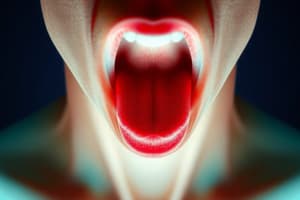Podcast
Questions and Answers
What is the primary characteristic of dysphagia?
What is the primary characteristic of dysphagia?
- Difficulty breathing
- Difficulty walking
- Difficulty swallowing (correct)
- Difficulty hearing
Which part of the body is primarily affected in oral dysphagia?
Which part of the body is primarily affected in oral dysphagia?
- Mouth (correct)
- Stomach
- Throat
- Esophagus
What is a common symptom of pharyngeal dysphagia?
What is a common symptom of pharyngeal dysphagia?
- Unexplained weight gain
- Difficulty breathing
- Coughing or gagging when swallowing (correct)
- Recurrent heartburn
Which of the following can cause esophageal dysphagia?
Which of the following can cause esophageal dysphagia?
What type of dysphagia can be due to tongue weakness after a stroke?
What type of dysphagia can be due to tongue weakness after a stroke?
Which symptom is NOT typically associated with dysphagia?
Which symptom is NOT typically associated with dysphagia?
What assessment methods can be used to diagnose dysphagia?
What assessment methods can be used to diagnose dysphagia?
Which type of therapy may be beneficial for oral dysphagia?
Which type of therapy may be beneficial for oral dysphagia?
What treatment approach might be recommended for pharyngeal dysphagia?
What treatment approach might be recommended for pharyngeal dysphagia?
In cases of severe dysphagia, what intervention might be necessary to provide nutrients?
In cases of severe dysphagia, what intervention might be necessary to provide nutrients?
Which type of dysphagia may require surgical procedures for treatment?
Which type of dysphagia may require surgical procedures for treatment?
Study Notes
Dysphagia: Causes, Symptoms, Diagnosis, and Treatment
Dysphagia is a condition characterized by difficulty swallowing, which can lead to several complications, including dehydration and malnutrition. It is more common in older people and infants and is usually caused by nerve or muscle problems. This article discusses the causes, symptoms, diagnosis, and treatment options for dysphagia.
Causes
The causes of dysphagia can be categorized into oral, pharyngeal, and esophageal dysphagia.
Oral Dysphagia (High Dysphagia)
Oral dysphagia occurs due to issues in the mouth, such as tongue weakness after a stroke, difficulty chewing food, or problems transporting food from the mouth.
Pharyngeal Dysphagia
Pharyngeal dysphagia involves issues in the throat, often caused by neurological problems or damage to the nerves, such as Parkinson's disease, stroke, or amyotrophic lateral sclerosis.
Esophageal Dysphagia (Low Dysphagia)
Esophageal dysphagia arises after the swallow and can be caused by intrinsic structural pathology, extrinsic compression, or disruption in normal motility.
Symptoms
Symptoms of dysphagia include difficulty swallowing solids, liquids, or both; choking when eating; coughing or gagging when swallowing; drooling; food or stomach acid backing up into the throat; recurrent heartburn; hoarseness; a sensation of food getting stuck in the throat or chest; unexplained weight loss; and bringing food back up.
Diagnosis
Diagnosing dysphagia requires a structured assessment to identify functional, neurologic, inflammatory, and malignant causes. Evaluation methods include questioning the patient about symptoms, swallow studies, barium swallow tests, and endoscopies.
Treatment Options
Treatment for dysphagia depends on the underlying cause. For oral dysphagia, speech and swallowing therapy may be helpful. Pharyngeal dysphagia often requires a combination of treatments, such as changes in diet, positioning during meals, and swallowing exercises. Esophageal dysphagia may necessitate surgical procedures.
In some cases, severe dysphagia may require a feeding tube to provide nutrients without the need to swallow.
Causes, diagnosis, and treatment of neurogenic dysphagia as an interdisciplinary clinical problem.
Olszewski J. Otolaryngol Pol. 2006; 60(4):491-500.
Studying That Suits You
Use AI to generate personalized quizzes and flashcards to suit your learning preferences.
Description
Learn about dysphagia, a condition characterized by difficulty swallowing, its causes such as oral, pharyngeal, and esophageal dysphagia, symptoms like choking and hoarseness, diagnostic methods including swallow studies and barium swallow tests, and treatment options such as speech therapy and surgical procedures.




